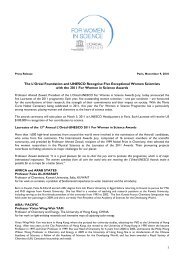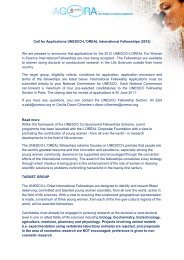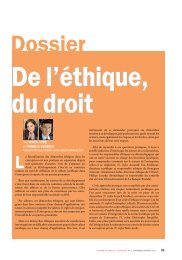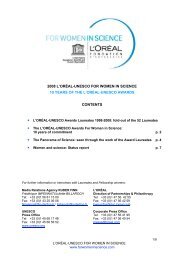2011 EDITION
2011 EDITION
2011 EDITION
You also want an ePaper? Increase the reach of your titles
YUMPU automatically turns print PDFs into web optimized ePapers that Google loves.
“In my country, women<br />
mainly study the socalled<br />
’pure’ sciences.<br />
Consequently, we<br />
contribute more than<br />
men to the life sciences,<br />
like biology and ecology.”<br />
ISRAEL<br />
Neurobiology<br />
Our conscious vision is triggered by<br />
the complex and rapid activation of the<br />
temporal and frontal lobes of the brain.<br />
Although the precise moment when<br />
this happens remains a mystery and<br />
has fuelled intense scientific debate,<br />
it is also a vital challenge for the treatment<br />
of certain diseases. By seeking<br />
to understand this mechanism, it<br />
should be possible to help people with<br />
consciousness disorders such as coma<br />
patients.<br />
Fascinated by the human brain, Hagar<br />
gelbard-Sagiv, 31, has a PhD in neurosciences<br />
from the Weizmann Institute<br />
of Science in Rehovot, Israel and has<br />
focused her work on the role of nerve<br />
Ladan<br />
Teimoori-Toolabi<br />
HOST INSTITUTION:<br />
The Sidney Kimmel Comprehensive Cancer<br />
Center, Johns Hopkins University, Baltimore,<br />
Maryland, USA<br />
Colorectal cancer, the second most common form of<br />
cancer in women and the third most common for men, is<br />
often detected at a late stage in Iranian patients, making<br />
treatment more difficult. Moreover, Iran does not have an<br />
organized cancer-screening programme.<br />
A certified medical doctor with a PhD in medical biotechnology,<br />
Ladan Teimoori-Toolabi, 34, is a postdoctoral researcher<br />
at the Pasteur Institute in Tehran. Her research<br />
focuses on developing gene therapy for colorectal cancers.<br />
Ladan plans to use her fellowship to investigate<br />
whether colorectal cancer can be reliably detected using<br />
blood samples, which she believes would be much more<br />
acceptable in her country.<br />
She plans to work on methylation, a complex biochemical<br />
modification process that can intervene in the repair<br />
of DNA, influencing the body’s capacity to repair damaged<br />
cells before they become cancerous. Methylation<br />
also exists in the development of cancers, blocking the<br />
normal functioning of genes and altering their activity.<br />
At the fellowship host institution in the United States,<br />
Ladan will use blood and tissue samples taken from<br />
HOST INSTITUTION:<br />
Division of Engineering and Applied Science,<br />
California Institute of Technology (Caltech),<br />
Pasadena, USA<br />
cells in memory, recall and visual perception. She<br />
plans to take direct electrophysiological recordings<br />
of neuron activity in the brains of consenting patients<br />
who have undergone neurosurgery to treat epilepsy.<br />
During these sessions, patients will be presented with<br />
two different images simultaneously, one in front of<br />
each eye. By measuring activity in different parts of the<br />
brain when the message is interpreted, Hagar hopes<br />
to track down when and where in the brain the visual<br />
signal of the two images enters consciousness and is<br />
interpreted as a single image.<br />
Hagar gelbard-Sagiv sees this research fellowship as<br />
an excellent opportunity to prepare to set up her own<br />
laboratory. To continue benefiting from clinical data for<br />
her research, she hopes to pursue her collaboration,<br />
notably with a neurosurgery department in an Israeli<br />
hospital.<br />
IRAN<br />
Medical biotechnology<br />
colorectal cancer patients in Iran to study<br />
the methylation state of genes associated<br />
with the cancer. She will compare these<br />
samples with ones taken from healthy<br />
people and hopes to find a correlation<br />
between the methylation state of the<br />
genes and the different stages of cancer.<br />
She will also study the same patients’<br />
response to treatment and their survival<br />
rates to see whether the methylation state<br />
can be used both as an early non-invasive<br />
diagnostic test and as a prognostic<br />
test for colorectal cancer.<br />
When she returns to Iran, Ladan Teimoori-Toolabi<br />
would like to work on developing<br />
this test and apply it to other cancers,<br />
such as pancreatic and lung cancer.<br />
Hagar<br />
gelbard-Sagiv<br />
“I hope my research will<br />
bring us closer to understanding<br />
the mechanisms<br />
that make us conscious<br />
beings, as well as help<br />
people with consciousness<br />
disorders.”
















